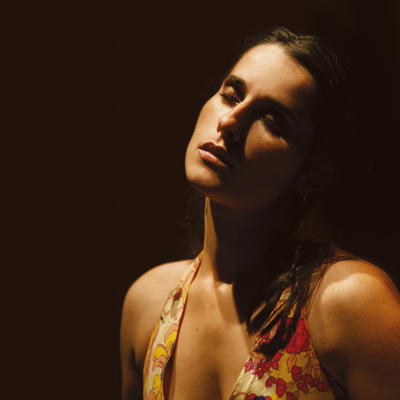Информация об исполнителе
Cristina Branco was born in December, 1972, in Almeirim, Ribatejo, Portugal, where she still lives. Her music is deeply rooted in tradition, yet essentially modern.
She grew up far from the fado houses of Lisbon and nothing suggested that she was predestined for the fado. Like almost all young Portuguese born after the revolution of 1974, she was interested in folk music, jazz, blues, bossa nova but not in fado. She regarded it as a genre for a different generation. This lasted until her 18th birthday, when her grandfather gave her the album Rara e Inйdita by Amбlia Rodrigues. Suddenly, Cristina Branco discovered all the emotions that the genre could offer in the close connections that arose among voice, poetry and music. The amateur singer - then studying communication sciences and still full of her ambition to become a journalist - began to develop her vocal technique and to take her new vocation seriously.
After that, Cristina studied the poems from which major fado lyrics are taken.
Since then, Cristina has worked on her fado repertory, accompanied by Custуdio Castelo on guitar and as composer.
Halfway through the nineties, other young musicians also found a new means of expression in the fado and this contributed to a surprising renaissance. Just as they did, Cristina Branco began to make clear choices in which respect for the tradition went hand in hand with the desire for renewal.
There can be no doubt that Cristina Branco is developing her own style from a number of primary components. She employs a traditional group (voice, Portuguese guitar, guitar and bass guitar) and offers us concurrently a light, warm and experienced voice; she mixes the traditional fado with themes and folk songs that are personal favourites and seems always to choose the words of the best Portuguese, or even Dutch poets with discretion.
User-contributed text is available under the Creative Commons By-SA License and may also be available under the GNU FDL.
She grew up far from the fado houses of Lisbon and nothing suggested that she was predestined for the fado. Like almost all young Portuguese born after the revolution of 1974, she was interested in folk music, jazz, blues, bossa nova but not in fado. She regarded it as a genre for a different generation. This lasted until her 18th birthday, when her grandfather gave her the album Rara e Inйdita by Amбlia Rodrigues. Suddenly, Cristina Branco discovered all the emotions that the genre could offer in the close connections that arose among voice, poetry and music. The amateur singer - then studying communication sciences and still full of her ambition to become a journalist - began to develop her vocal technique and to take her new vocation seriously.
After that, Cristina studied the poems from which major fado lyrics are taken.
Since then, Cristina has worked on her fado repertory, accompanied by Custуdio Castelo on guitar and as composer.
Halfway through the nineties, other young musicians also found a new means of expression in the fado and this contributed to a surprising renaissance. Just as they did, Cristina Branco began to make clear choices in which respect for the tradition went hand in hand with the desire for renewal.
There can be no doubt that Cristina Branco is developing her own style from a number of primary components. She employs a traditional group (voice, Portuguese guitar, guitar and bass guitar) and offers us concurrently a light, warm and experienced voice; she mixes the traditional fado with themes and folk songs that are personal favourites and seems always to choose the words of the best Portuguese, or even Dutch poets with discretion.
User-contributed text is available under the Creative Commons By-SA License and may also be available under the GNU FDL.
показывать / спрятать больше







 |
|



![VA - 100% Pure Music (2008) [FLAC (tracks + .cue)] VA - 100% Pure Music (2008) [FLAC (tracks + .cue)]](cache/thumbnail42/browse136440.jpg)

